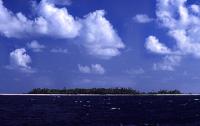 Tuvalu is a tiny Polynesian island nation in roughly the geometric center of the Pacific Ocean. The CIA World Factbook describes the nation’s economy as follows: Tuvalu consists of a densely populated, scattered group of nine coral atolls with poor soil. Only eight of the atolls are inhabited. The country has no known mineral resources and few exports and is almost entirely dependent upon imported food and fuel. Subsistence farming and fishing are the primary economic activities. Fewer than 1,000 tourists, on average, visit Tuvalu annually. Job opportunities are scarce and public sector workers make up most of those employed. About 15% of the adult male population work as seamen on merchant ships abroad….
Tuvalu is a tiny Polynesian island nation in roughly the geometric center of the Pacific Ocean. The CIA World Factbook describes the nation’s economy as follows: Tuvalu consists of a densely populated, scattered group of nine coral atolls with poor soil. Only eight of the atolls are inhabited. The country has no known mineral resources and few exports and is almost entirely dependent upon imported food and fuel. Subsistence farming and fishing are the primary economic activities. Fewer than 1,000 tourists, on average, visit Tuvalu annually. Job opportunities are scarce and public sector workers make up most of those employed. About 15% of the adult male population work as seamen on merchant ships abroad….
By pure luck, the growth of on-line video is helping to support Tuvalu. On-line video is booming. Last month, 190 million Americans watched online video content, according to comScore. So what does this have to do with Tuvalu?
Back in the 90s, internet domain name extensions were assigned to various countries. Britain received .uk; France, .fr; Australia, .au; and so on. Tuvalu was assigned .tv. As reported by the New York Times, “At the height of the Internet gold rush, in 1999, a start-up named DotTV paid Tuvalu $50 million over 12 years for the right to sell .tv to other companies. The .tv suffix represented two of the most recognizable letters in the world, and DotTV’s founders believed .tv could be bigger than .com because TV viewing would soon migrate to the web….
In 2002, Verisign, a large manager of web addresses, acquired the company and still operates the .tv domain today. It agreed in 2011 to manage the .tv address through 2021, and the payments to Tuvalu’s government are said to be a couple million dollars a year.”
Domain name income paid most of the cost of paving the streets of Funafuti and installing street lighting in mid-2002.
In some respects the windfall received by Tuvalu’s .tv internet extension is a 21st century version of the revenue earned for years by other small islands selling postage stamps to collectors. In 2012, Pitcairn Island made just over $200,000 or about 20% of the island’s revenue from stamps sales.
Europeans named the island group the Ellice Islands around 1819. In 1974, when the islands split off from the Gilberts, the name was formally changed to Tuvalu. While most of the slightly over 10,000 residents on Tuvalu may not have access to the internet, they are benefiting from the name change and from those who watch TV on the web.

Yes, it was a strange one that I did remember.
However there is this from July 18, 2010
Internet domain riches fail to arrive in Tuvalu
The Pacific island hoped the sale of its ‘.tv’ suffix to websites would boost its troubled economy. Now it says it is being deprived of millions in royalties
http://www.independent.co.uk/news/world/australasia/internet-domain-riches-fail-to-arrive-in-tuvalu-2029221.html